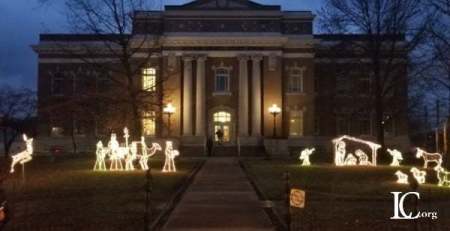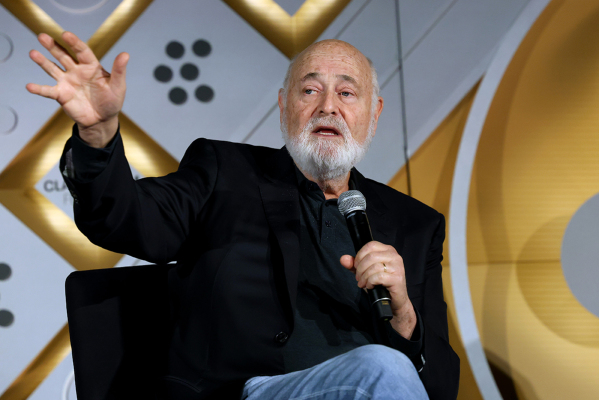7th Circuit weighs legality of Nativity scene at Indiana courthouse after atheist complaint

The legality of an Indiana courthouse's public Nativity scene was argued in federal appeals court Thursday, with religious freedom advocates contending that that U.S. Supreme Court precedent permits the presence of a Nativity scene on public land.
Lawyers from the Liberty Counsel, a conservative national nonprofit law firm devoted to preserving religious freedom in the United States, argued in front of the U.S. 7th Circuit Court of Appeals on behalf of Jackson County, Indiana.
The county is defending a Nativity display at its courthouse located in Brownstown. The Nativity display is one part of a larger Christmas display that is placed on the courthouse lawn on an annual basis.
The display also includes lighted figures of Santa Claus, a sleigh, reindeer and other non-religious holiday symbols. But in 2018, a "concerned local resident” contacted the Freedom From Religion Foundation to complain about the display.
FFRF, a secular legal group that advocates for a strict separation of church and state, promptly wrote a letter to the Jackson County commissioners in December 2018.
The group alleged that “it is unlawful for the County to maintain, erect, or host a holiday display that consists solely of a Nativity scene, thus singling out, showing a preference for, and endorsing one religion.”
FFRF staff attorney Ryan Jayne cited the 1989 Supreme Court case Cty. Of Allegheny v. ACLU of Pittsburgh, where the court ruled that a Nativity display in a county courthouse had the “unconstitutional effect” of “promoting or endorsing religious beliefs.”
Earlier this year, federal judge Tanya Pratt, an Obama appointee, sided with FFRF and the concerned atheist resident, Rebecca Woodring, by enjoining the display.
Liberty Counsel argues that the plaintiff has no standing to sue because she “does not live or work in the county and does not transact any business in the Jackson County Courthouse."
Also, Liberty Counsel took issue with Pratt’s failure to reference the 2019 Supreme Court decision of American Legion v. American Humanist Association.
In the case, the nation's high court ruled that a 40-foot tall cross erected in Bladensburg, Maryland to honor the memory of World War I soldiers did not violate the Establishment Clause of the Constitution's First Amendment. The Establishment Clause prohibits governments from making any law “respecting an establishment of religion.”
Liberty Counsel contended that “the flawed reasoning on both the issue of standing and the Establish Clause sets up the case for an appeal that could go all the way to the Supreme Court.”
“The Jackson County holiday display does not violate the First Amendment,” said Mat Staver, the Founder and Chairman of Liberty Counsel, in a statement.
“The Supreme Court and many federal courts have ruled such displays are constitutional, especially when the display includes other secular symbols of the holiday, and this display in Jackson County is no exception. The High Court has never recognized this type of manufactured ‘offended’ observer standing and this challenge fails for both lack of standing and lack of merit.”
Another law firm specializing in religious liberty has come out in support of Jackson County. The First Liberty Institute, which describes itself as “the largest legal organization in the nation dedicated exclusively to defending religious freedom for all Americans,” wrote an amicus brief in support of Jackson County.
First Liberty lawyer Lea Paterson seconded Liberty Counsel’s argument. She argues that based on the American Legion decision, the presence of the Nativity scene on public property is not unconstitutional.
“Just last year, the Supreme Court explained that public religious displays that are part of the nation’s history and tradition are presumptively constitutional," she said in a statement.
“Whether war memorials, holiday decorations, flags, or government seals, passive public displays with religious content are commonplace, appropriately recognizing the role faith plays in the lives of many citizens. We are hopeful that the Seventh Circuit will follow the Supreme Court’s precedent in American Legion and restore Jackson County’s traditional Nativity display."
The Brownstown Ministerial Association purchased the lighted Nativity scene in 2003. Jackson County approved its placement on the courthouse lawn during the Christmas season.
Since the Supreme Court's decision in American Legion, First Liberty contends that three other U.S. Courts of Appeal have applied the American Legion precedent to reject "Lemon Test" arguments, such as the one used by Pratt when she ruled earlier this year.





















